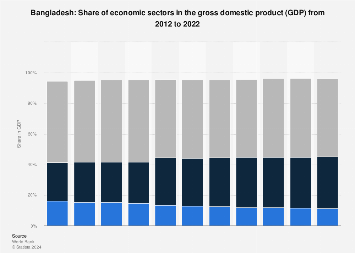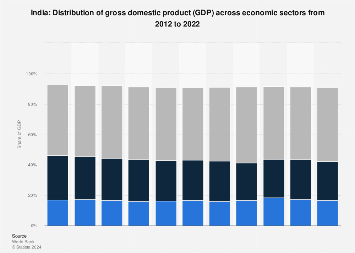China's annual export to Bangladesh is worth $15 billion. I think it is high time Bangladesh asks China to relocate its factories to Bangladesh. This way more investment from China can cancel the trade imbalance which is hurting Bangladesh badly.
How to install the app on iOS
Follow along with the video below to see how to install our site as a web app on your home screen.
Note: This feature may not be available in some browsers.
You are using an out of date browser. It may not display this or other websites correctly.
You should upgrade or use an alternative browser.
You should upgrade or use an alternative browser.
Bangladesh Economy: News & Updates
- Thread starter Raquib
- Start date
I thought most countries' govts encourage local people to build industries to limit imports. Should BD ask China to build 5,000 companies to build factories here if the number of items we import is 5,000? China may not find it feasible.China's annual export to Bangladesh is worth $15 billion. I think it is high time Bangladesh asks China to relocate its factories to Bangladesh. This way more investment from China can cancel the trade imbalance which is hurting Bangladesh badly.
BD should self-help by constructing its own factories. Foreign companies invest in other countries when there are big demands of their products there.
fallstuff
ELITE MEMBER

- Joined
- Nov 20, 2009
- Messages
- 9,436
- Reaction score
- 0
- Country
- Location
Chinese will do only what benefits them.China's annual export to Bangladesh is worth $15 billion. I think it is high time Bangladesh asks China to relocate its factories to Bangladesh. This way more investment from China can cancel the trade imbalance which is hurting Bangladesh badly.
Bangladeshis
Tell me what are rates for factory labour in your country?
What is a salary of:
What is the price of utilities?
How mature is the supply chain? How easy it is to get hands on components, etc?
How fluid is the labour market? How fast can you hire people listed above?
How fast it is for a foreign company to setup there?
How easy it is to get into industrial parks with concessionary tax rates?
Tell me what are rates for factory labour in your country?
What is a salary of:
- Mechanical engineer 3-4 years work experience
- Mechanical engineer fresh grad
- Electronics engineer 3-4 years work experience
- Electronics engineer fresh grad
- Assembly line worker 3-4 years experience
- Assembly line worker random man from the street
- Software developer 4-5 years experience
- Office worker hr/financial
- Office worker shipping/logistics
What is the price of utilities?
How mature is the supply chain? How easy it is to get hands on components, etc?
How fluid is the labour market? How fast can you hire people listed above?
How fast it is for a foreign company to setup there?
How easy it is to get into industrial parks with concessionary tax rates?
Facts have proved that Myanmar, Vietnam, and India are not worthy of Chinese investment. I personally suggest that China increase investment in Bangladesh, and Myanmar is a dangerous country. Myanmar people have relatively low IQs, simple thinking, and easy to be incited. Bangladesh people have a strong motivation to get rich. If they can control the NGO funded by the West, it should be a country worth investing in. The only role of those NGOs is to make the country unable to do anything. Those who participate in NGOs don’t care about the country’s economic development. For them, economic development has nothing to do with their careers, and they also mainly get financial assistance from Western countries. I think that the West's annual performance appraisal for them is to see how many development projects they destroy.
Myanmar is an example. There are a large number of NGOs, and this country looks hopeless.
Myanmar is an example. There are a large number of NGOs, and this country looks hopeless.
Shorisrip
FULL MEMBER

- Joined
- Aug 16, 2016
- Messages
- 551
- Reaction score
- 0
- Country
- Location
Facts have proved that Myanmar, Vietnam, and India are not worthy of Chinese investment. I personally suggest that China increase investment in Bangladesh, and Myanmar is a dangerous country. Myanmar people have relatively low IQs, simple thinking, and easy to be incited. Bangladesh people have a strong motivation to get rich. If they can control the NGO funded by the West, it should be a country worth investing in. The only role of those NGOs is to make the country unable to do anything. Those who participate in NGOs don’t care about the country’s economic development. For them, economic development has nothing to do with their careers, and they also mainly get financial assistance from Western countries. I think that the West's annual performance appraisal for them is to see how many development projects they destroy.
Myanmar is an example. There are a large number of NGOs, and this country looks hopeless.
Agree about Myanmar. The country is resource-rich, but hasn't been stable since world war 2, and has gone from one of the wealthiest in South-east Asia to the poorest. Investors want stability, not coups, civil wars and protests every now and then. Vietnam however is probably in a better position than us. It is neighboring Southern China, so has a geographical advantage, and has a lot of similarities with Bangladesh. Both countries are very homogeneous (85% kinh and 98% Bengali respectively). Bangladesh however has a larger population, which will likely keep wages lower for a longer time than Vietnam, thus making it competitive in that regard. Both countries also enjoy favourable trade agreements with the Chinese market itself. Chinese investors should invest in both countries, depending on the type of industry, and the destination for the products produced.
Bilal9
ELITE MEMBER

- Joined
- Feb 4, 2014
- Messages
- 26,545
- Reaction score
- 9
- Country
- Location
Unless one has been under a rock - one would have known that in Bangladesh the rate of industrialization has steadily crept up. Comparing 2011 and 2021 figures - industrial activity contributed 25 and 33% - an 8% increase.

 www.statista.com
www.statista.com
However what is surprising is that rate of industrialization in India actually is creeping downward in that same decade - slowly but surely. In India's case, it went down from 30% to 25%, a 5% decrease.

 www.statista.com
www.statista.com
So - how will India replace China as the world's factory? No amount of subsidies will make this happen (witness make-in-India etc.)
I think Bangladesh and Indonesia are more likely candidates for this in the post-China scenario for low-value-added items. But Indonesia is also moving into higher value added items like TV's and refrigerators rather than shoes and clothes, as is Bangladesh.
Am I right or - am I right?

Bangladesh - share of economic sectors in the gross domestic product 2023 | Statista
This statistic shows the share of economic sectors in the gross domestic product (GDP) in Bangladesh from 2013 to 2023.
However what is surprising is that rate of industrialization in India actually is creeping downward in that same decade - slowly but surely. In India's case, it went down from 30% to 25%, a 5% decrease.

India - Distribution of gross domestic product (GDP) across economic sectors 2023 | Statista
In 2023, almost half of India’s GDP was generated by the services sector, a slight and steady increase over the last 10 years.
So - how will India replace China as the world's factory? No amount of subsidies will make this happen (witness make-in-India etc.)
I think Bangladesh and Indonesia are more likely candidates for this in the post-China scenario for low-value-added items. But Indonesia is also moving into higher value added items like TV's and refrigerators rather than shoes and clothes, as is Bangladesh.
Am I right or - am I right?
Last edited:
Bilal9
ELITE MEMBER

- Joined
- Feb 4, 2014
- Messages
- 26,545
- Reaction score
- 9
- Country
- Location
Agree about Myanmar. The country is resource-rich, but hasn't been stable since world war 2, and has gone from one of the wealthiest in South-east Asia to the poorest. Investors want stability, not coups, civil wars and protests every now and then. Vietnam however is probably in a better position than us. It is neighboring Southern China, so has a geographical advantage, and has a lot of similarities with Bangladesh. Both countries are very homogeneous (85% kinh and 98% Bengali respectively). Bangladesh however has a larger population, which will likely keep wages lower for a longer time than Vietnam, thus making it competitive in that regard. Both countries also enjoy favourable trade agreements with the Chinese market itself. Chinese investors should invest in both countries, depending on the type of industry, and the destination for the products produced.
Great post. I agree with all points but I want to add that there are a very large number of Chinese invetsors already present in Bangladesh. With the latest road/rail communication infra built and 100 Export zones going into action, Bangladesh is ready to be a mini-China export juggernaut.
Here is an export zone in Northern Bangladesh and although the area is far away from our behemoth export zones near the coastal belts, it is easy to see how willing people are to work and to change their lives and that of their families. I regularly post investment and development related videos in this thread.
Bangladesh Economic & Infrastructure Development - Updates & Discussions
Which idiot told you that we don't have toilets in metro? He said, toilet exist in Delhi metro stations but not inside like Dhaka metro, they are outside of Delhi metro stations. Here is the video that vlogger talking about this topic- While an Indian explained why Pajeets need to urinate on...
pdf.defence.pk
Similar threads
- Replies
- 102
- Views
- 8K
- Replies
- 20
- Views
- 2K
- Replies
- 0
- Views
- 499


